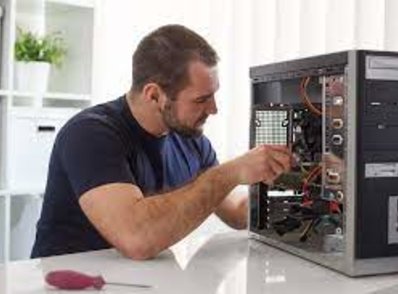
What is the price to repair my computer?
Common Issues & Solutions
The device is not functioning, no electricity.
If your computer doesn't start, that's the clearest sign of a problem. Before taking it in for repair, do some troubleshooting first.
Before doing anything else, check if your home has enough power. Troubles with the electricity could be the cause of the issue.
If the issue is still not fixed, it likely means there's a power failure. You can take your device to be repaired by a technician who will inspect the components or replace the cables.
The possible solutions for the power supply issue are a battery, power jack, or AC adapter.
Computer is Running Slow
Older computers often experience decreased speed, while even some new machines can lag if multiple programs are running simultaneously.
You don't need to take the computer in for maintenance the first time it begins slowing down. There are some scans you can do at home, such as the Windows Performance Monitor, or you can assess the condition of your hard drive. When a hard drive has very limited space left, it may trigger the computer to slow and programs to open more sluggishly. It could also be that the computer is experiencing slow internet speed.
If other causes are ruled out and your computer is still slow, get it fixed quickly.
Possible Fixes: Hard Drive, More Memory, Reinstall Windows, Remove Virus
Randomly Freezes and Restarting
Nothing is more annoying than when your computer randomly crashes in the middle of important work. You may even lose vital data if it freezes and restarts.
If your computer is randomly freezing up or shutting down unexpectedly, it's a good idea to take it in for repair.
Potential Fixes: Hard Disk Drive, Random Access Memory, Windows Reinitialization, Power
Supply Unit, Motherboard.
Programs Not Opening
It is conceivable that when you keep pressing on a program without it opening, there could be two causes. Perhaps the file you are attempting to open is wrecked now. Also, it is plausible that possibly you have unintentionally eradicated part of the program you are trying to open. On the off chance that the program was functioning before and out of nowhere began fizzling, you can attempt restarting your framework to check whether the issue is solved. In case the issue perseveres after disregarding all potential outcomes, it would be wise to take the PC for fix.
Your screen is inundated with pop-up messages.
If your computer is overwhelmed with pop-up messages, and they won't go away even after clicking them, it's likely a virus. To prevent any further damage to your system, consider having an expert investigate the issue.
Grinding noises coming from a fan.
When your PC begins making unexpected sounds, it is clearly a hint of a dilemma with the system. Commonly we usually imagine that it is the fanning when a PC starts to create commotion. On the other hand, problems can derive from numerous other portions in addition to the fan. Occasionally, your hard drive might also engender a clicking noise that implies some issue. In case this ticking persists until you power the computer off, you should bring it for mend. An proficient would be proficient to fix the origin of the sound more precisely.
What costs less, fixing a computer or getting a new one?
People often ask us if they should fix or buy a new computer.
To get the best price for the repair service you require, it is advised to obtain a quotation first.
Our shop provides assistance in addressing these queries. We often come across PCs that are a decade old and we advise getting them fixed. On the
Once you have an estimate for the repairs, it's important to consider:
• Compare your purchase price with the computer's original price.
• How much would the repaired computer cost if it were to be resold?
• At what point in the line-up do you plan to resell it?
• Selling your computer on eBay is easy--we'll show you how soon!
• What would be the cost to upgrade to a comparable or better model?
When considering replacing or repairing your computer, you should next consider the cost of buying a new one plus any additional accessories. This will help you make a more informed choice.
What repairs are usually not cost effective?
Scenario One: Computer repair services that cost more than 50% of the replacement cost are usually not worth the expense.
Our formula can be adjusted to fit your specific situation. We usually don't recommend replacing the motherboard as a last resort.
Repairing components such as screens, hard disk drives, keyboards, software and power ports is usually more economical than replacing them.
For example, if fixing your old computer's motherboard costs $300, and you can purchase a new one for $500, it would be more sensible to buy the new one.
It would not be a good idea to have your old device repaired unless you have valuable data stored on it.
If your computer is five years or older and keeps having issues, it's probably not cost-effective to keep investing in it.
If your computer is exposed to liquid, the potential long-term effects are serious, even if the immediate damage appears minor.
Our Comments on Fluid Damages: Yes, we have the competency to solve these issues. We elect not to. This is not a technical or capability dilemma, this is an ethical obstacle for us, as we would rather not repair something that we cannot thoroughly guarantee for its lifetime. For years, we would detect fluid damages resurface after days, weeks, or even years from the original issue.

